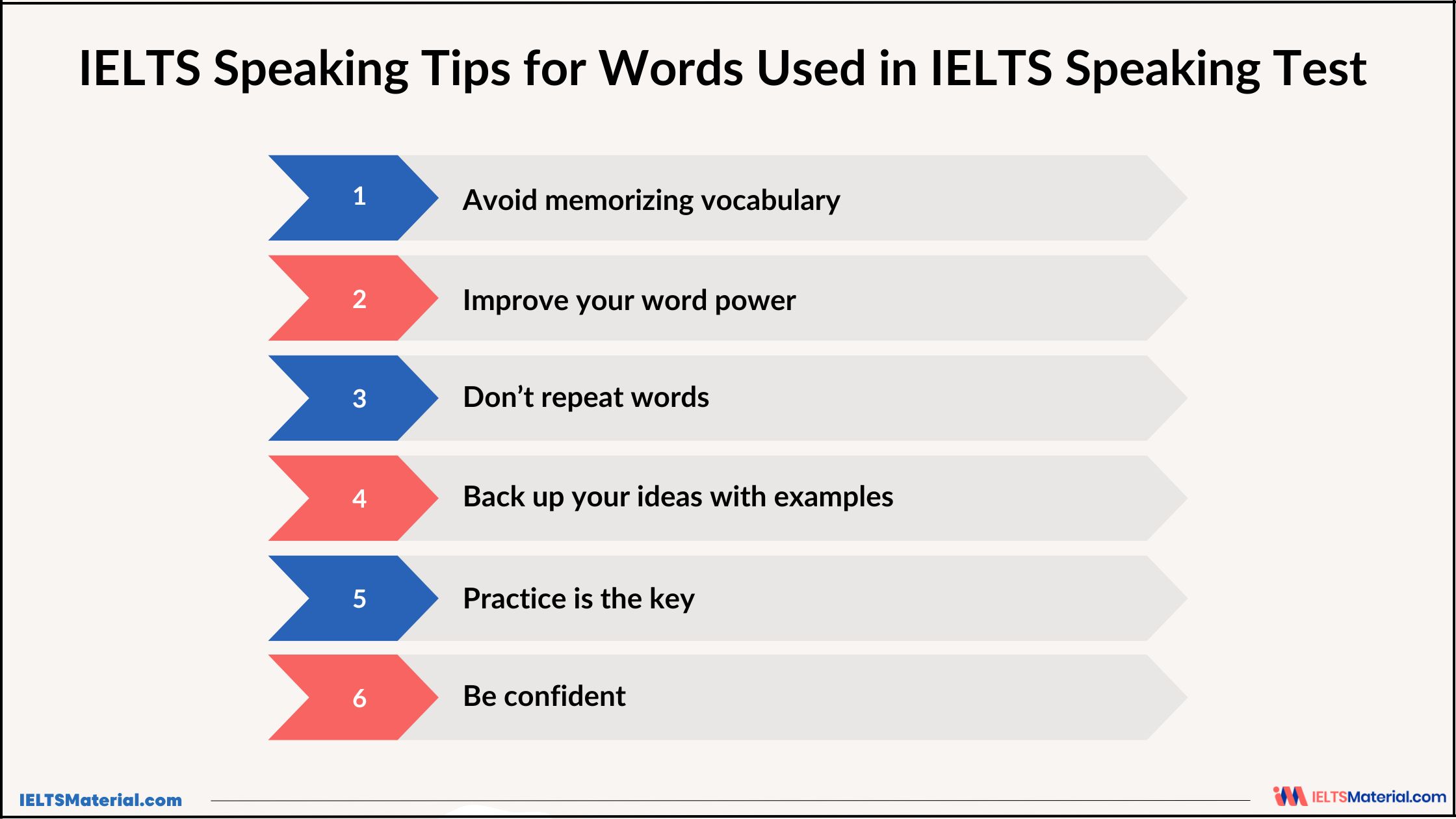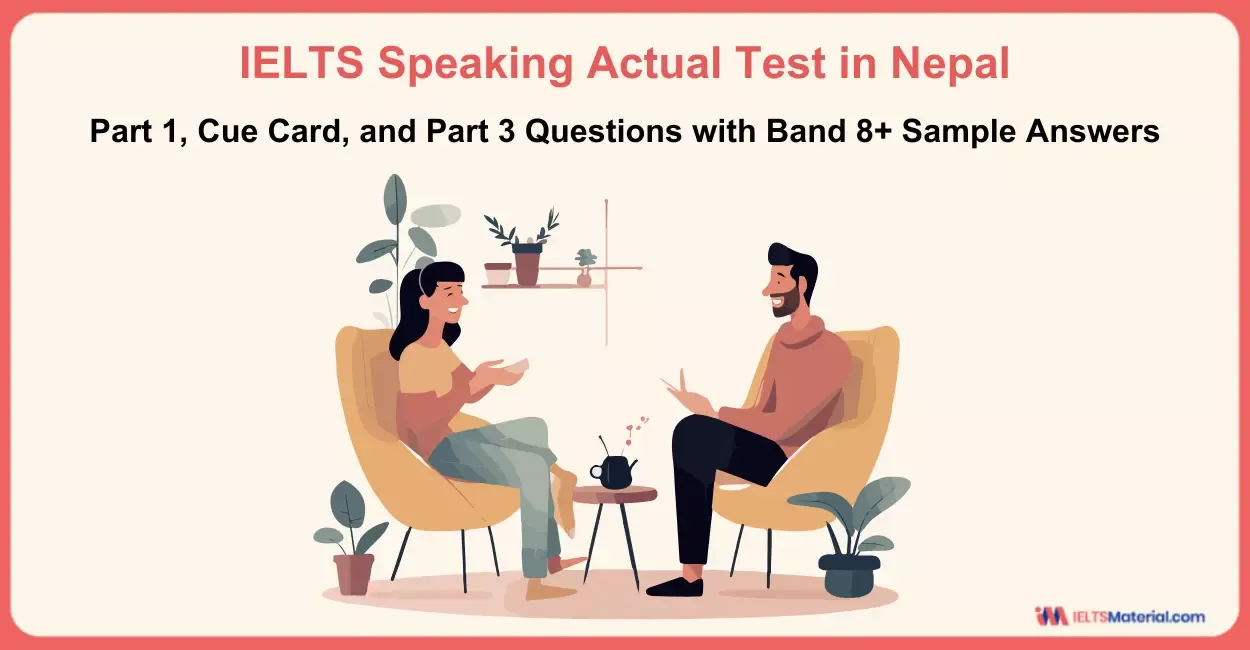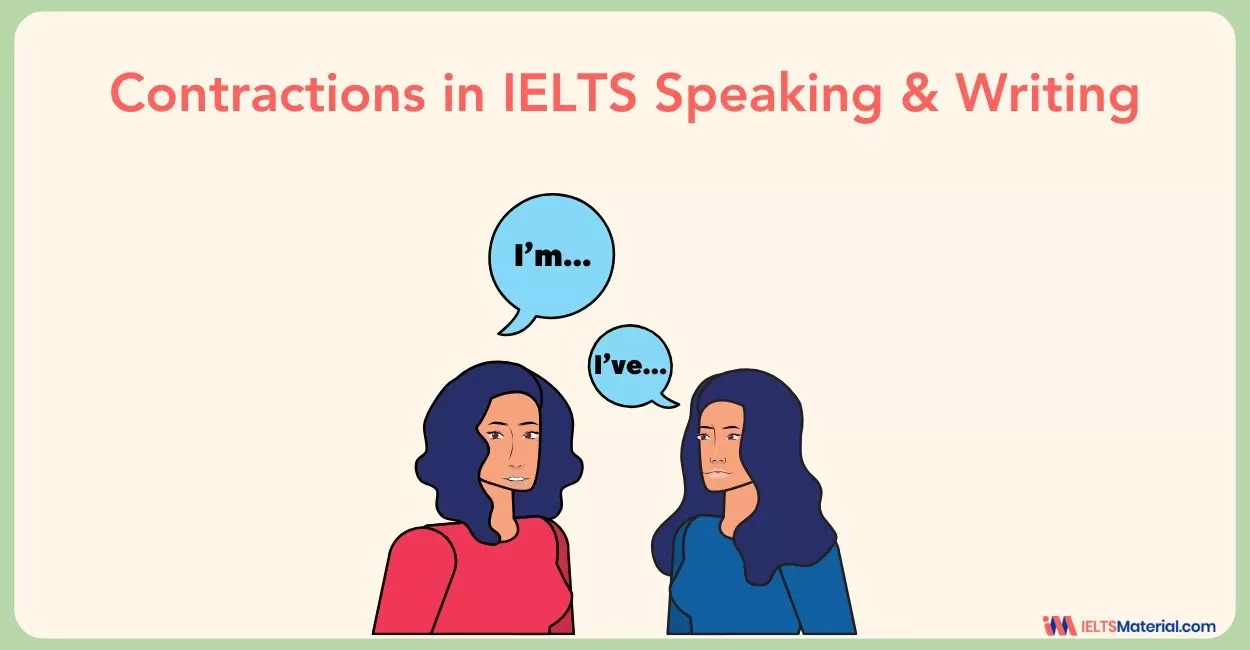75+ Common English Words Used in IELTS Speaking Test
9 min read
Updated On
-
Copy link
A wide vocabulary is crucial for IELTS Speaking, but it’s important to use words naturally and confidently. Include idioms, linking words, and examples to enhance fluency and coherence, avoid memorizing and practice regularly for a high IELTS score.
Table of Contents

Get a Complimentary IELTS Speaking Strategies PDF
Lexical resources or a wide range of vocabulary words for IELTS Speaking is as important as fluency, pronunciation and grammatical accuracy in the speaking module to achieve a top IELTS band score.
But, the dilemma regarding the right kind of words to use in the speaking IELTS test is common among IELTS candidates. Therefore, we have listed a number of words used in IELTS Speaking to make your preparation hassle-free.
Common Vocabulary Words for IELTS Speaking
IELTS aspirants are often confused when deciding the best words to use for IELTS Speaking answers. While some believe that using bombastic words for speaking test are preferable, others incline towards the most common words in IELTS exam.
However, it is important to remember that whatever words you use, it should be used correctly and you should be confident while using it. So, let’s look at some words to use in speaking IELTS with their meaning and usage.
|
Word |
Meaning |
|---|---|
|
Accurate |
correct or precise |
|
Adjacent |
nearby, next to |
|
Advocate |
support |
|
Aromatic |
fragrant; having a pleasant and distinctive smell |
|
Awesome |
extremely impressive or daunting; inspiring awe |
|
Awful |
very bad or unpleasant |
|
Barely |
only just; almost no |
|
Beneficial |
favorable or advantageous; resulting in good |
|
Blonde |
having fair or light-colored hair |
|
Certainly |
without doubt; surely |
|
Chance |
opportunity; occurrence and development of events |
|
Combat |
take action to reduce or prevent (something bad or undesirable) |
|
Consecutive |
following continuously |
|
Convey |
communicate |
|
Debate |
argue about (a subject), especially in a formal manner |
|
Deceptive |
giving an appearance or impression different from the true one; misleading |
|
Deduce |
arrive at (a fact or a conclusion) by reasoning; draw as a logical conclusion |
|
Diminish |
make or become less |
|
Disclose |
make (secret or new information) known |
|
Dynamic |
characterized by constant change, activity, or progress; energetic |
|
Eager |
having or showing keen interest or enthusiasm |
|
Easing |
making (something unpleasant or intense) less serious or severe |
|
Effortlessly |
with ease; without effort or difficulty |
|
Evident |
plain or obvious; clearly seen or understood |
|
Fake |
not genuine; counterfeit or fraudulent |
|
Faulty |
having or displaying faults; not perfect; defective |
|
Flout |
openly disregard (a rule, law, or convention) |
|
Fright |
sudden intense feeling of fear |
|
Generous |
showing a readiness to give more of something |
|
Genuinely |
in a sincere and genuine manner |
|
Gorgeous |
beautiful; very attractive |
|
Grasp |
seize and hold firmly |
|
Hack |
cut with rough or heavy blows; gain unauthorized access to data in a system or computer |
|
Hasty |
done with excessive speed or urgency; hurried |
|
Hostile |
unfriendly; antagonistic |
|
Immediate |
occurring or done at once; instant |
|
Impact |
action of one object coming forcibly into contact with another |
|
Incentive |
thing that motivates or encourages one to do something |
|
Inferior |
lower in rank, status, or quality |
|
Jarring |
incongruous in a striking or shocking way; clashing |
|
Jargon |
special words or expressions used by a profession or group that are difficult for others to understand |
|
Keenly |
in a sharp or penetrating way |
|
Knack |
an acquired or natural skill at performing a task |
|
Leading |
acting as a guide; primary or principal |
|
Likely |
probable; expected to happen or be true |
|
Lately |
recently; not long ago |
|
Magnificient |
impressively beautiful, elaborate, or extravagant; striking |
|
Mandatory |
required by law or rules; compulsory |
|
Merely |
just; only |
|
Negligent |
failing to take proper care in doing something |
|
Notorious |
famous or well known, typically for some poor quality or deed |
|
Noted |
well known or worth noticing; famous |
|
Obstacle |
thing that blocks one's way or prevents or hinders progress |
|
Offensive |
causing someone to feel deeply hurt, upset, or angry |
|
Passionate |
showing or caused by strong feelings or a strong belief |
|
Potentially |
with the capacity to develop or become something in the future |
|
Priviledge |
special right, advantage, or immunity granted or available only to a particular person or group |
|
Qualify |
be entitled to a particular benefit or privilege by fulfilling a necessary condition |
|
Quest |
long or arduous search for something |
|
Recall |
bring (a fact, event, or situation) back into one's mind, especially so as to recount it to others |
|
Rebel |
person who rises in opposition or armed resistance against an established government or ruler |
|
Reliable |
consistently good in quality or performance; able to be trusted |
|
Remote |
far away in distance; distant |
|
Sense |
faculty by which the body perceives an external stimulus |
|
Sincere |
free from pretense or deceit; genuine |
|
Spacious |
having ample space; roomy |
|
Substantial |
of considerable importance, size, or worth |
|
Tend |
regularly or frequently behave in a particular way or have a certain characteristic |
|
Thoughtful |
showing consideration for the needs of other people; considerate |
|
Threaten |
express one's intention to harm or kill (someone) |
|
Unanimously |
without opposition; with the agreement of all people involved |
|
Unusual |
not habitually or commonly occurring or done |
|
Ultimately |
finally; in the end |
|
Vaguely |
in a way that is uncertain, indefinite, or unclear; roughly |
|
Vigilant |
keeping careful watch for possible danger or difficulties |
|
Worthy |
having or showing the qualities or abilities that merit recognition in a specified way |
|
Wreck |
the remains of something that has been badly damaged or destroyed |
|
Yield |
produce or provide (a natural, agricultural, or industrial product) |
|
Zealous |
showing zeal; fervent or enthusiastic devotion, often extreme or fanatical |
|
Zenith |
the time at which something is most powerful or successful |
Popular Idiomatic Expressions for IELTS Speaking
Unlike in IELTS Writing, having a solid command of idioms will significantly boost your score in the Speaking portion of the IELTS exam. Given below are some useful idioms for IELTS Speaking to score band 8.0+ based on different topics that you can use in your answers:
|
Category |
Idiom |
Meaning |
Additional Resource |
|---|---|---|---|
|
Animals |
A fish out of water |
A person who feels uncomfortable in unfamiliar surroundings. |
|
|
Don’t count your chickens before they hatch |
Never predict success before it happens. |
||
|
Raining cats and dogs |
Raining heavily. |
||
|
Let the cat out of the bag |
Reveal a secret. |
||
|
Kill two birds with one stone |
Accomplish two goals with one action. |
||
|
Health |
Alive and kicking |
To be alive, well, and active. |
Common Idioms to Boost Your IELTS Score – Topic : Health, illness, and death |
|
Go under the knife |
To undergo surgery. |
||
|
Not feeling like myself |
Feeling different due to illness or distress. |
||
|
To have a new lease of life |
Renewed sense of vitality after a difficult period. |
||
|
Under the weather |
Feeling unwell or sick. |
||
|
Fit as a fiddle |
To be in very good health. |
||
|
Break a sweat |
To exert effort, especially physically. |
||
|
Money |
Cost an arm and a leg |
Very expensive. |
|
|
Save for a rainy day |
Save money for difficult times. |
||
|
Make ends meet |
To survive financially. |
||
|
Live from hand to mouth |
To have little money. |
||
|
Pay through the nose |
Pay much more than a fair price. |
||
|
Foot the bill |
To pay for something, often reluctantly. |
||
|
Happiness & Anger |
Lose my cool |
To become angry or lose composure. |
|
|
Go through the roof |
Extreme emotions, usually anger. |
||
|
Make my blood boil |
To feel extreme anger. |
||
|
Over the moon |
Extremely happy or delighted. |
||
|
Made my day |
Something that greatly improves one's day. |
||
|
Music to my ears |
Something very pleasing to hear. |
||
|
Food |
Bitter pill to swallow |
An unpleasant truth or situation to accept. |
Ten Food Idioms that are right under your nose to help Score Band 8.0+ |
|
Cry over spilt milk |
To be upset over something irreversible. |
||
|
Food for thought |
Something that prompts reflection. |
||
|
Hard nut to crack |
A difficult problem or situation. |
||
|
To be spoon-fed |
To receive information in an overly easy manner. |
||
|
Have a sweet tooth |
Love sugary foods. |
||
|
Bite off more than you can chew |
Take on a task bigger than one’s ability. |
||
|
Travel |
Hit the road |
Begin a journey. |
|
|
From pillar to post |
Moving continuously without stability. |
||
|
Live out of a suitcase |
Travel frequently without a permanent home. |
||
|
At the wheel |
Driving a vehicle. |
||
|
Hitch a lift/ride |
Get a ride from someone else. |
||
|
To travel on a shoestring |
Travel with a limited budget. |
||
|
In the middle of nowhere |
A remote and isolated location. |
||
|
Sports |
Hit it out of the park |
Do something exceptionally well. |
|
|
Keep your eye on the ball |
Stay focused. | ||
| Throw in the towel | Give up. | ||
| The ball is in your court | It’s your decision or responsibility to act. |
Do you think knowing these words used in IELTS Speaking is enough?
List of IELTS Linking Words for Speaking
When you speak, the examiner will be able to follow your ideas and stories more easily if you use some basic linking words for IELTS Speaking section and natural phrases, as these IELTS linking words for speaking are straightforward and informal.
Here is a list of linking words used in IELTS speaking test:
|
Category |
Linking Words/Phrases |
|---|---|
|
Linking Words for Time |
|
|
Linking Words for Causes and Solutions |
|
|
Linking Words for Adding Information |
|
|
Phrases to Begin with |
|
|
Linking Phrases to Express Opinion |
|
IELTS Speaking Tips for Words Used in IELTS Speaking Test

What is an IELTS preparation or vocabulary guide without tips? Incomplete, right? So, let’s go through some useful IELTS Speaking tips to impress the examiner and make sure that you use the words used in IELTS Speaking test effectively.
- Avoid memorizing vocabulary: Don’t just memorize the words to use in speaking IELTS. Make sure you know to use them correctly and naturally.
- Improve your word power: Expand your vocabulary by learning new words and phrases related to the common IELTS multilevel speaking Part 2 & 3 topics with model answers and use them while practicing IELTS Speaking practice tests.
- Don’t repeat words: Avoid repeating the most common words in IELTS Speaking. Use a variety of latest IELTS Speaking vocabulary to boost your score and showcase your language skills.
- Back up your ideas with examples: Develop and elaborate your answers for IELTS Speaking with examples, personal experience and anecdotes.
- Practice is the key: Practice regularly to ensure that your understanding fluency and coherence in IELTS Speaking and pronunciation are on point along with IELTS Grammar rules. Check the IELTS pronunciation guide for a better guidance.
- Be confident: Finally, be confident and maintain a positive attitude. Don’t be afraid to ask for clarification if something is unclear.
Learn Words to Use in IELTS Speaking with IELTSMaterial
If you’re looking to enhance your speaking skills for the IELTS exam, IELTSMaterial can be a valuable resource. Whether it is about updating your vocabulary with words used in IELTS Speaking test or brushing up your pronunciation, our experts are your all-time partners.
Feel free to check out our highly rated IELTS Speaking learning material with example answers and audio or get in touch with our IELTS experts if you need more advice. Take the step you need to boost your prep further and receive a Band 8+ on the IELTS Speaking test.
Additional Reads
Frequently Asked Questions
What is the purpose of IELTS linking words for speaking?
Can idioms be used in the IELTS speaking test?
What are the 5 words to use in IELTS Speaking that can reduce your score?
How to learn words to use in IELTS Speaking and improve vocabulary for the IELTS Speaking test?
Which words should I use in IELTS speaking?
Is it essential that I expand my vocabulary in preparation for the IELTS Speaking exam?
How many words should I try to use in the speaking portion of the IELTS exam?
What are some of the common topics for learning vocabulary words for IELTS Speaking?
What are the useful phrases that can be used in the IELTS Speaking test?
Can I get an 8+ band score in IELTS Speaking if I use the most common words in IELTS?
Explore IELTS related articles

Bonus IELTS Speaking part questions with Answers
Explore other Speaking Articles



Kasturika Samanta

Prity Mallick
Recent Articles

Nehasri Ravishenbagam

Nehasri Ravishenbagam

Haniya Yashfeen





Post your Comments